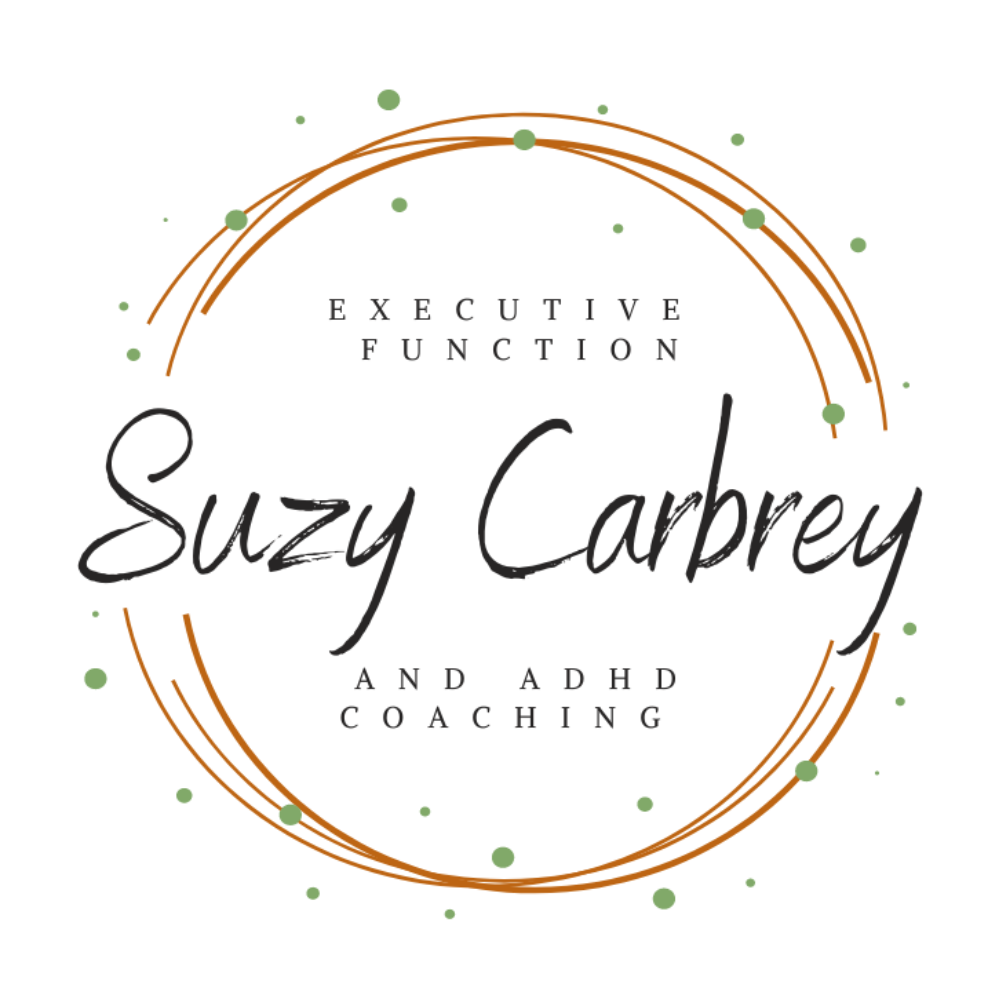Let’s Talk About That Gap Between Intention and Action
The gap between knowing and doing is not a character flaw, it’s often the result of how your brain processes tasks, emotions, and time. Adults with executive functioning challenges often have the skills to succeed in theory; you know what the steps are, you’ve read the books, and you’ve even had success in other areas. But in practice, something seems to get in the way. Every. Time.
And that’s frustrating.
But it’s also explainable. Executive functioning skills are responsible for all the little (and big) steps between having an idea and making it happen. They include:
- Task initiation – the ability to get started
- Planning and prioritization – deciding what needs to be done and in what order
- Working memory – holding information in your mind as you work
- Cognitive flexibility – shifting gears when plans change
- Emotional regulation – managing frustration, anxiety, or perfectionism
- Sustained attention – staying focused long enough to finish
These skills act like an internal management system, and when that system is taxed, delayed, or inconsistent, everyday tasks can become unexpectedly hard.
This isn’t about laziness. It’s about load. When your executive function system is overloaded, even simple changes can feel impossible to carry out.

Why It’s Not “Just Do It” (Even Though You Want To)
There’s a popular myth that if you care enough, you’ll find a way. If you just wanted it badly enough, you’d make it happen. But that myth is built on the assumption that willpower is the only variable.
In reality, wanting something and being able to do it are two very different things.
When executive functions are under pressure due to ADHD, burnout, anxiety, sensory sensitivities, or the chronic overwhelm of parenting and professional life, it’s like trying to run a marathon on a sprained ankle. Your brain is working so hard just to manage the basics that adding one more thing feels impossible, even if it’s something you genuinely care about.
So when you say “I didn’t do it,” what’s really happening might be:

- You didn’t know where to start (task initiation barrier)
- You forgot a key step or lost the plan (working memory overload)
- You got overwhelmed by emotions (emotional regulation challenges)
- Your environment was too distracting or chaotic (external mismatches)
- Your brain was simply too tired to manage something new (mental fatigue)
These are real barriers. And once you see them clearly, you can begin to approach change with curiosity instead of criticism.
Reframing the Narrative: You're Not Failing—You're Navigating
When you understand that executive function challenges are part of the picture, the story changes. You’re no longer the unreliable narrator who just “can’t get it together.” You become someone who is navigating a real and valid set of obstacles with creativity and persistence.
This shift in perspective matters.
Because when we label ourselves as lazy or incapable, we stop looking for solutions. We shrink. We give up.
But when we realize, “Hey, my brain has a unique operating system, it’s not broken, just different,” we unlock a whole new way of approaching change: with self-awareness, adaptability, and self-compassion.
Common Executive Function Barriers (and How They Show Up)
Let’s look at some of the biggest brain-based blockers that get in the way of change, even when we want that change deeply.
1. Task Initiation Problems
You might have the time and tools, but you just… can’t start. This isn’t laziness. It’s a disconnect in the brain between intention and action.
This might show up as:
- Spending hours circling around a task, thinking about it, prepping for it… but never starting.
- Getting stuck in analysis paralysis, waiting to feel “ready” or for the perfect moment.
- Suddenly doing unrelated tasks (hello, deep-cleaning the fridge instead of opening that email).
👉 Try this: Break the task down to the smallest possible step, so small it feels silly. Don’t “clean the kitchen,” just “walk to the sink.” Don’t “write a blog,” just “open the laptop.” Forward motion begins with a frictionless start.

2. Working Memory Overload
Working memory is the brain’s “mental sticky note.” It holds onto the information you need right now to do a task. When it’s overloaded or inconsistent, you might forget your plan entirely or lose track of your steps mid-way through.
This might show up as:
- Getting up to do something and forgetting what it was.
- Making a plan… then losing the paper or forgetting to look at it.
- Remembering all the things you meant to do only once your head hits the pillow.
👉 Try this: Externalize your brain. Use a checklist, a sticky note, a whiteboard, or a voice memo. Don’t rely on memory; create scaffolds that support it.
3. Emotional Regulation Difficulties
Even a small task can feel enormous if it’s emotionally charged. Perfectionism, fear of failure, frustration, or shame can make a simple action feel unsafe, as if there’s danger in the doing.
This might show up as:
- Avoiding a task because you’re afraid of doing it “wrong.”
- Feeling overwhelmed by big emotions before, during, or after starting.
- Trying to “white-knuckle” your way through and burning out
👉 Try this: Use compassionate self-talk to create safety. Instead of “What’s wrong with me?” ask, “What emotion might be getting in the way?” Try reframing the task: “This is a little hard for me, and that’s okay. I can do hard things in small steps.”

4. Mental Fatigue
When your brain is already juggling parenting, work, logistics, appointments, messages, and the invisible labor of adulting, it might have zero leftover fuel to start something new. Change requires energy, and energy is finite.
This might show up as:
- Feeling “fried” by the end of the day—even when the to-do list is still long.
- Procrastinating not because you don’t care, but because you’re out of gas.
- Being more productive in the morning, but crashing in the afternoon.
👉 Try this: Identify your natural energy patterns. Can you batch small tasks during a low-energy time and save big changes for when you’re fresher? Give yourself full permission to rest. It’s a resource, not a reward.
5. Environmental Mismatches
Your brain may be incredibly sensitive to your physical or sensory environment. Clutter, noise, lighting, temperature, or even visual overstimulation can completely block focus or motivation.
This might show up as:
- Feeling agitated or shut down in certain rooms.
- Avoiding your desk because it feels chaotic
- Struggling to start a task when there are too many things in view.
👉 Try this: Curate your environment like a support system. Declutter just one surface. Use a lamp instead of harsh overhead lights. Play music or white noise. Create a “starting corner” that makes beginning easier.
What to Try Instead of Beating Yourself Up
Shame and self-blame might feel familiar, but they’re not effective motivators. In fact, they tend to increase stress and decrease access to executive function skills.
Here’s what helps instead:
Externalize Your Support
Don’t keep it all in your head. Offload as much as possible into visual, physical, or digital systems. Planners, reminders, checklists, alarms, post-its, color coding; these aren’t crutches. They’re tools.
Think of it like building scaffolding so your brain can do what it’s meant to do without burnout.

Make the First Step Laughably Easy
Ask yourself: “What would this look like if it were 10% easier?”
Can you:
- Set a timer for just 2 minutes?
- Open the document without writing anything?
- Put your workout shoes by the door without committing to a full routine?
Momentum builds when we lower the bar and allow ourselves to simply begin.
Expect Resistance—and Plan for It
It’s not a sign of failure if a task feels hard to start. That’s the nature of change with executive function challenges. Expect some pushback from your brain, and decide ahead of time how you’ll respond.
Maybe that means:
- Having a “resistance ritual” (take 3 breaths, say a mantra, play a pump-up song).
- Texting a friend for accountability.
- Using a “temptation bundling” strategy (pair a hard task with a reward or favorite activity).

Use Compassionate Self-Talk
Try phrases like:
- “This is hard, and I’m still learning.”
- “It’s okay to start over. Let’s try again.”
- “The next best step is good enough.”
Track Effort, Not Just Outcome
You don’t need a finished product to deserve credit. You tried. You showed up. You took action. Even thinking about change is a form of effort, especially when your brain is tired.
Create a system for celebrating effort:
- Did you think about your goal today? ✅
- Did you prepare something that will help tomorrow? ✅
- Did you catch yourself before spiraling into shame? ✅
Progress isn’t always linear, but it is always worth honoring.
Learn more with Online Coaching for Executive Functioning / ADHD
Ready to gain control and enhance your executive functioning? As an experienced and compassionate coach, I specialize in providing support for executive functioning and ADHD. To embark on your journey, please reach out to me at 708-264-2899 or email hello@suzycarbrey.com to schedule a FREE 20-minute discovery call consultation.
With a background as a speech-language pathologist, I have a strong foundation in executive functioning coaching. My graduate degree program in SLP placed a significant emphasis on cognition, including executive functions, and I have years of experience in medical rehabilitation, providing cognitive-communication therapy. Additionally, I have completed an ADHD Services Provider certification program, I am Solutions-Focused Brief Therapy Diamond Level 1 certified and I am trained in the Seeing My Time® executive functioning curriculum.
Experience the convenience and effectiveness of online coaching, backed by studies that demonstrate equal results to in-person services. Parents, professionals, and emerging adults love the convenience and privacy of receiving coaching from their own homes.
Whether you reside in Chicago, Milwaukee, Indianapolis, Kansas City, or anywhere else around the globe, I am here to assist you. Schedule your discovery call consultation today, and I eagerly anticipate the opportunity to work with you!
Please note that although I am a certified speech-language pathologist, all services Suzy Carbrey LLC provides are strictly coaching and do not involve clinical evaluation or treatment services. If you require a formal speech therapy evaluation and treatment, please inform me, and I can provide appropriate recommendations.


